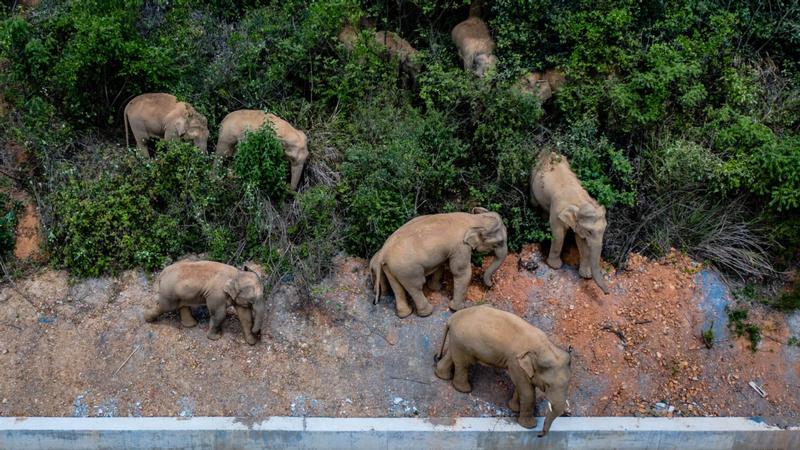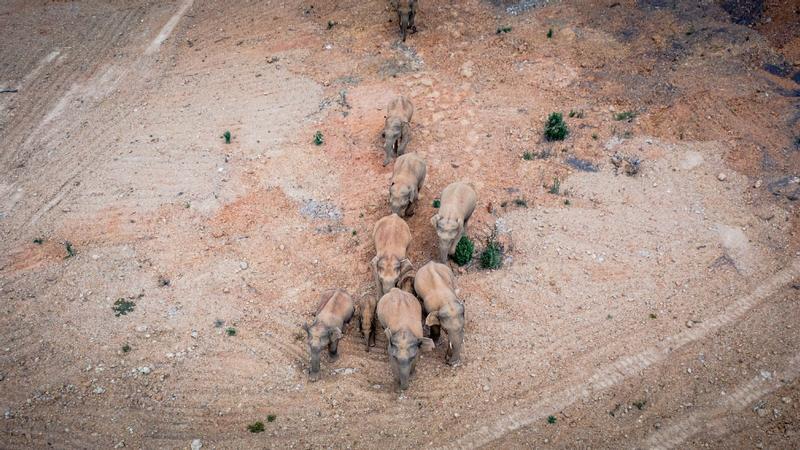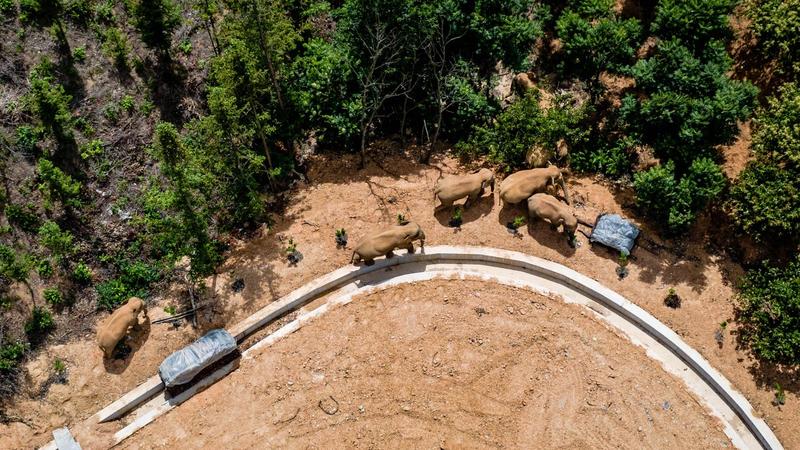Alerts issued as animals make 400-km journey in Yunnan
 A herd of wild Asian elephants makes its way in Yuxi's Eshan Yi autonomous county, Yunnan province, on May 28, 2021. (HU CHAO / XINHUA)
A herd of wild Asian elephants makes its way in Yuxi's Eshan Yi autonomous county, Yunnan province, on May 28, 2021. (HU CHAO / XINHUA)
Many people from Yunnan province often claim to have seen wild animals, including elephants, roaming local streets, as the province is known as the nation's "kingdom of wildlife".
However, such claims have recently been verified beyond a doubt.
Video footage taken on Thursday in the Eshan Yi autonomous county shows a herd of 15 wild Asian elephants roaming the streets in a downtown area at night after leaving their habitat in Xishuangbanna National Nature Reserve in the south of Yunnan last year.
The herd originally consisted of 17 elephants when it left the nature reserve, but two of the animals gained access to alcohol in a village and became inebriated, according to local officials. The pair was later reported to have returned to Pu'er, a city north of the Xishuangbanna Dai autonomous prefecture.
As the elephants made their 400-kilometer journey from Xishuangbanna to Eshan, they were monitored by forestry police, firefighters and public security workers using drones and cameras. Alerts were also sent to local residents to avoid injuries.
In urban areas, the roaming elephants attracted considerable attention from the media and locals. Photographs and video footage of the animals quickly went viral.
One video, which received more than 2.5 million views within five hours, shows the elephants walking along under dim street lighting, their huge bodies almost blocking a road.
Another video, recorded by a camera placed near a factory entrance, shows an elephant trying in vain to push away steel bars.
Footage taken by drones shows the herd eating vegetables and corn on farmland.
 An elephant roams the streets in Eshan county, Yunnan province, at night. (PHOTO PROVIDED TO CHINA DAILY)
An elephant roams the streets in Eshan county, Yunnan province, at night. (PHOTO PROVIDED TO CHINA DAILY)
On Friday night, the elephants were seen moving toward Efeng Mountain Forest Park in Eshan county.
On Saturday, when the herd entered forests in the north of the county, it became difficult to observe the animals or follow their traces. Drones are being used to track the elephants.
As of Sunday morning, the 15 elephants were 50 km from Kunming's Jinning district and 100 km from the downtown area of the provincial capital.
Chen Shengyao, a forestry firefighter, said: "They've entered deep forest and it is hard for drones to record them. We are now monitoring them with infrared drones used by the military."
He added that nine members of his team are taking shifts to monitor the herd day and night and that roads entering the forest have been blocked for safety reasons.
 Drones are used to keep track of the elephants. (WU CHAO / XINHUA)
Drones are used to keep track of the elephants. (WU CHAO / XINHUA)
Top-level protection
The Asian elephant, which is included on the International Union for Conservation of Nature Red List of Threatened Species as "endangered", enjoys Class-A protection in China, the same level afforded to the giant panda.
Yunnan is the sole habitat of wild Asian elephants in China. Before the 1970s, the species was threatened due to a number of factors, including a surge in the human population, reduced forestry areas and illegal hunting. The number of elephants dropped significantly.
However, due to determined protection efforts in recent decades, the Asian elephant population in China has risen from 170 in the 1970s to 300, according to the Yunnan Provincial Forestry and Grassland Administration.
The province has established 11 nature reserves with a total area of about 510,000 hectares. The number of counties inhabited by wild Asian elephants in Yunnan has risen from seven in 2017 to eight. Last year, 7,500 hectares of land was also transformed into new habitat for the animals.
However, the growing elephant population has resulted in more conflicts between the animals and humans, resulting in more than 60 deaths and injuries. Damage to property caused by the animals from 2011 to 2018 is estimated at more than 170 million yuan (US$26.69 million), according to the authorities.
The 15 roaming elephants have damaged 561,333 square meters of crops and caused financial losses of nearly 6.8 million yuan on their 400-km journey, but no deaths or injuries to local residents have been reported.
Zhao Youfang, a villager in Nuodong, Menghai county, Xishuangbanna, said: "Wild elephants have appeared frequently in nearby areas in recent years. The government monitors their activities and helps us set up chat groups on social media platforms to share alerts, but we are not worried about possible injuries.
"Elephants are a protected species, but we need protection, too. Compared to these animals, humans could not stand even a single blow," he said, recalling an incident several years ago, in which a person in a neighboring village was killed by elephants.
 A herd of wild Asian elephants makes its way in Yuxi's Eshan Yi autonomous county, Yunnan province, on May 28, 2021. (PHOTO / XINHUA)
A herd of wild Asian elephants makes its way in Yuxi's Eshan Yi autonomous county, Yunnan province, on May 28, 2021. (PHOTO / XINHUA)
Fatal attack
For most people who have never been in close contact with a wild elephant, it is hard to imagine the danger and damage the giant animals can cause. An adult Asian elephant typically weighs between 3 and 5 metric tons and is capable of killing a person in a few seconds.
Such an incident happened in 2016, when two people in Nanlanghe village, Meng'a county, lost their lives after being attacked by elephants.
Villager Zhang Xiuying told Beijing Youth Daily in a recent interview: "It's not funny at all to have wild elephants roaming freely in the village, especially when I recall images of a young man whose head was crushed by the feet of these giants. It was horrible."
After the incident, Zhang said many locals could not sleep at night. Most villagers used to live in one-story houses, but moved for a time to two-story homes in the village for greater safety.
Wild Asian elephants can roam up to 40 kms a day, and an adult eats 150 to 200 kilograms of food each day.
Guo Xianming, deputy director of the research institute at Xishuangbanna Nature Reserve, said a lack of food is the animals' main problem.
Supplies of the elephants' favorite food-plume grass-have fallen due to the growth of some invasive plants.
Since 2008, Xishuangbanna has provided a "canteen" for wild animals-mainly Asian elephants. It provides them with bamboo, corn, plantain and sugarcane.
In 2017, this pilot project was expanded to double its original size, in an effort to reduce friction between villagers and the elephants eating their crops due to food shortages.
A year later, an elephant "canteen "was built in Pu'er, a city north of Xishuangbanna, which is also a habitat for wild Asian elephants. With a total planting area of 200 hectares, the project received investment of 3.7 million yuan.
Moreover, the authorities in Yunnan have taken out insurance cover for residents in the province since 2014. The government pays the premiums and insurance companies compensate residents if they are attacked by wild animals.
In 2016, the forestry department also launched a pilot project, setting up an elephant alert system by using drones. Artificial intelligence and broadcast systems were introduced the following year to improve efficiency of the alert system.
 The herd of 15 elephants arrives in Eshan county. (PHOTO / XINHUA)
The herd of 15 elephants arrives in Eshan county. (PHOTO / XINHUA)
Boundary lines
Despite "canteens" being set up, tasty food in local communities remains a big temptation for the elephants.
Chen Mingyong, a life sciences professor at Yunnan University who has been studying the wild elephants for decades, said, "About two-thirds of them are now living outside reserves because the increasing forest canopy density has resulted in food shortages."
He said that establishing boundary lines is the best solution to conflicts between the animals and humans. In addition to natural boundaries such as rivers and mountains, Chen had the idea of using iron bars to fence villages close to the elephants' habitat.
"Compared with limiting the elephants' activities, it's more practical to fence the villages," he said.
However, fencing is not cheap, and the elephants' movements are sometimes unpredictable, as evidenced by the herd that has recently headed north.
Chen said it is unusual for the elephants to leave their habitat and head north at this time of year, when food for the animals in mountains and forests is scarcer in areas at higher altitudes.
"Another possibility is that this herd lost its way during the march because its leader lacked experience," he said.
It is not known when the herd will stop heading north and move south to rainforests.
In Kunming, there is a street named "Xiangyan" (elephant eye), where foreign diplomats from Southeast Asian countries broke their journeys to send elephants as gifts to rulers during the Yuan Dynasty (1271-1368).
However, if those wild giants do appear again in this street, they will pose a considerable problem.
Contact the writers at yangwanli@chinadaily.com.cn


